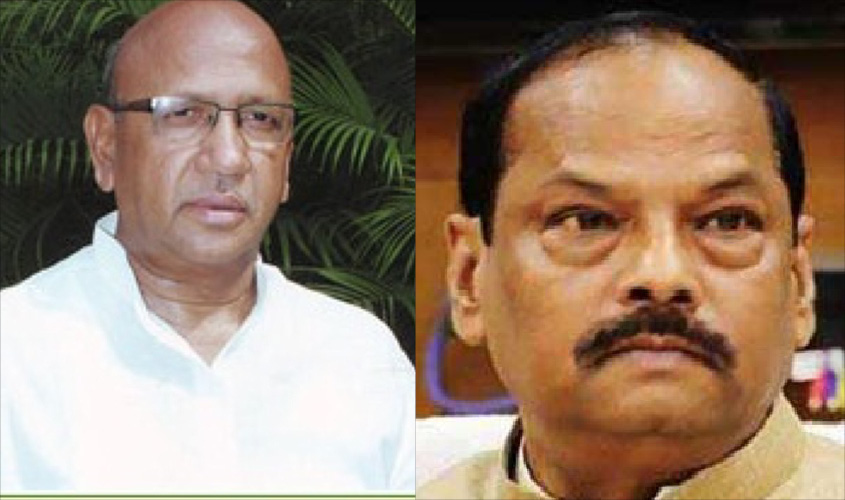Roy said he would resurrect the Meinhardt deal, allegedly involving Das.
New Delhi: Former BJP leader Saryu Roy, who came to the limelight after defeating then Jharkhand Chief Minister Raghubar Das from the latter’s constituency, is firm on raising the issue of alleged corruption in the Meinhardt deal in the next Assembly session. The state government has till now not given sanction to register an FIR in the case.
Speaking to The Sunday Guardian, Roy said he would resurrect the deal, involving Das, who lost his Jamshedpur East seat in the recently concluded Assembly elections. He also said there were many other irregularities, including the mining scam, which he would expose. Roy has now been removed from the BJP after he decided to contest against Das as an Independent candidate.
Roy said no action has been taken on the report on the committee of the five engineers-in-chief and thereafter, report of the technical committee of vigilance which had allegedly held Das responsible for appointment of Singapore-based consultant Meinhardt in violation of norms in 2005. He also pointed out that the Assembly committee he headed had rejected Meinhardt’s bid and recommended action against those involved in the firm’s appointment.
Roy expressed the hope that new Chief Minister Hemant Soren would give sanction to lodge an FIR in this case.
In 2003-04, the Jharkhand Urban Development Department had appointed a consultant, ORG Marg, through open bid to prepare DPR of sewage-drainage scheme for Ranchi at the cost of around Rs 4 crore. It submitted PPR (preliminary project report) for approval at appropriate authority so that after its approval, final DPR would be submitted. A payment of around Rs 1.14 crore was made up to this level.
Meanwhile, after the 2005 general elections, a new government was formed in the state and Das became Urban Development Minister. He asked for the concerned file and abruptly cancelled the agreement with ORG for “delay” in submitting DPR.
ORG ultimately moved the High Court against the cancellation. The court, as per the condition of the agreement, ordered arbitration under a retired Chief Justice of Kerala High Court.
The arbitrator found the cancellation arbitrary and issued the award in favour of ORG and ordered the Jharkhand government to pay the due amount of around Rs 3.62 crore to ORG.
After the cancellation of the ORG agreement, the Urban Development Department, Jharkhand government, floated a new tender for DPR preparation for the same work through QBS (Quality Based System). The Singapore consultant Meinherdt was appointed at a cost of around Rs 25 crore.
The appointment was challenged in the state Assembly. The Speaker constituted a committee of legislators to probe the allegations of corruption and irregularities raised on the floor of Assembly. The committee in its report recommended that after the opinion of a technical committee, the government may go ahead.
As per the recommendation of the Assembly committee, the Urban Development Department constituted a technical committee headed by its own chief engineer which was of the view that appointment of Meinherdt was valid and as per the ToR of the tender. After this, the work order to prepare DPR for combined sewage and drainage system of RMC was given to the Meinherdt. Meanwhile, Speaker of Jharkhand Assembly constituted an Implementation Committee to oversee the way reports of various Assembly committees were implemented by the concerned government departments.
In normal way, the report of the special committee earlier constituted to probe the corruption and irregularities in appointment of Meinherdt was placed before the “Implementation Committee” which further analysed the report in detail and found that the appointment of Meinherdt was not above board and in fact Meinherdt’s proposal should have been rejected at the very first stage of eligibility criteria and its technical as well financial proposal should not have been opened and considered for further evaluation. Later on, the government constituted a high-level committee of five engineers-in chief under chairmanship of Engineer-in-Chief, Roads, to technically examine the Assembly implementation committee report.
Four members of the technical committee, in a joint report, observed that technically, Meinherdt was not eligible (as per the terms of the tender), though it seemed financially sound on the basis of previous years’ report. The five-member committee in a separate report opined that beginning from floating the tender to its evaluation, irregularities were made. The government did not act upon the implementation committee report.
Meanwhile, the matter went to High Court which asked the petitioner to go to the Vigilance Commissioner who would act on the basis of the merit in the case. The petitioner moved the Vigilance Commissioner who ordered the Vigilance Technical Cell to probe the matter.
The technical cell investigated it at length, analysed minute details of the tender evaluation and found that Meinherdt was appointed illegally.
When no further action was taken by the Vigilance Commissioner, a Congress leader, Alok Dubey moved the High Court again, which directed the petitioner to go to the Vigilance Commissioner for putting an FIR for action.
He did so, but no action has been taken since then. A petition

